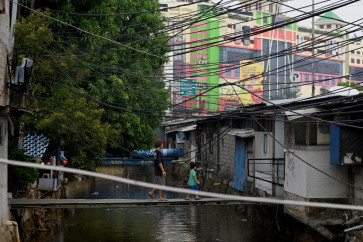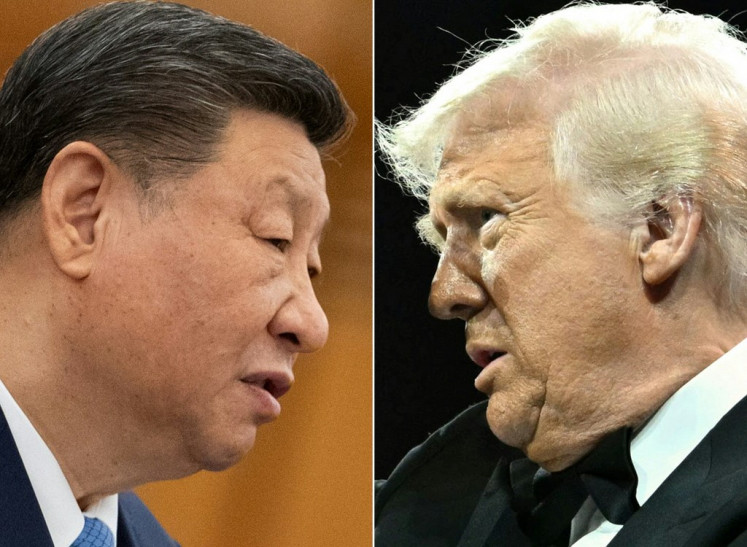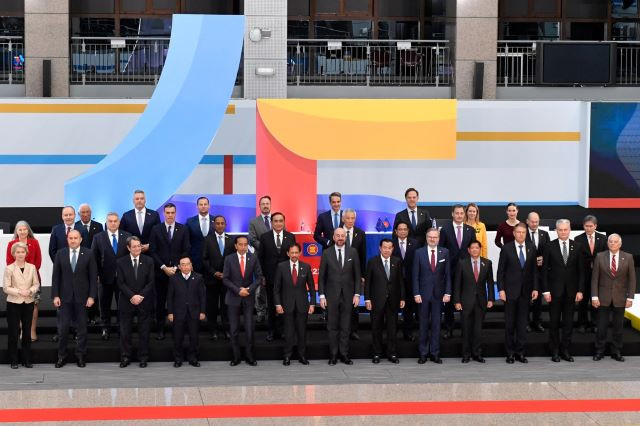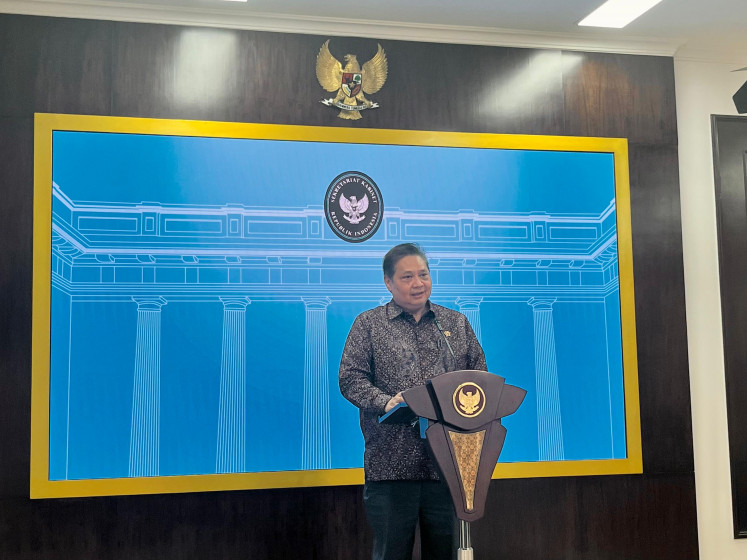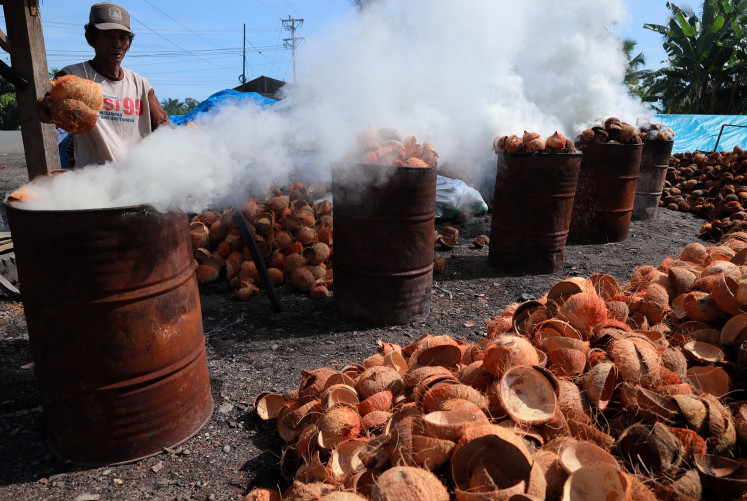Finally, a game changer against illegal fishing
After President Joko “Jokowi” Widodo signed the ratification of the Port State Measures Agreement (PSMA) in May, Indonesia can rest assured of global partnership in its effort to prevent, deter and eliminate illegal, unreported and unregulated (IUU) fishing. The long due event heralded Indonesia’s stronger commitment to combat IUU fishing largely blamed for the world’s dwindling fish stocks and the missing US billion dollars worth of marine resources vital for food security.Now, Indonesia is among 34 countries, plus the EU, that have joined the agreement that aims to block access of IUU fishing products to the legal market.
Change text size
Gift Premium Articles
to Anyone
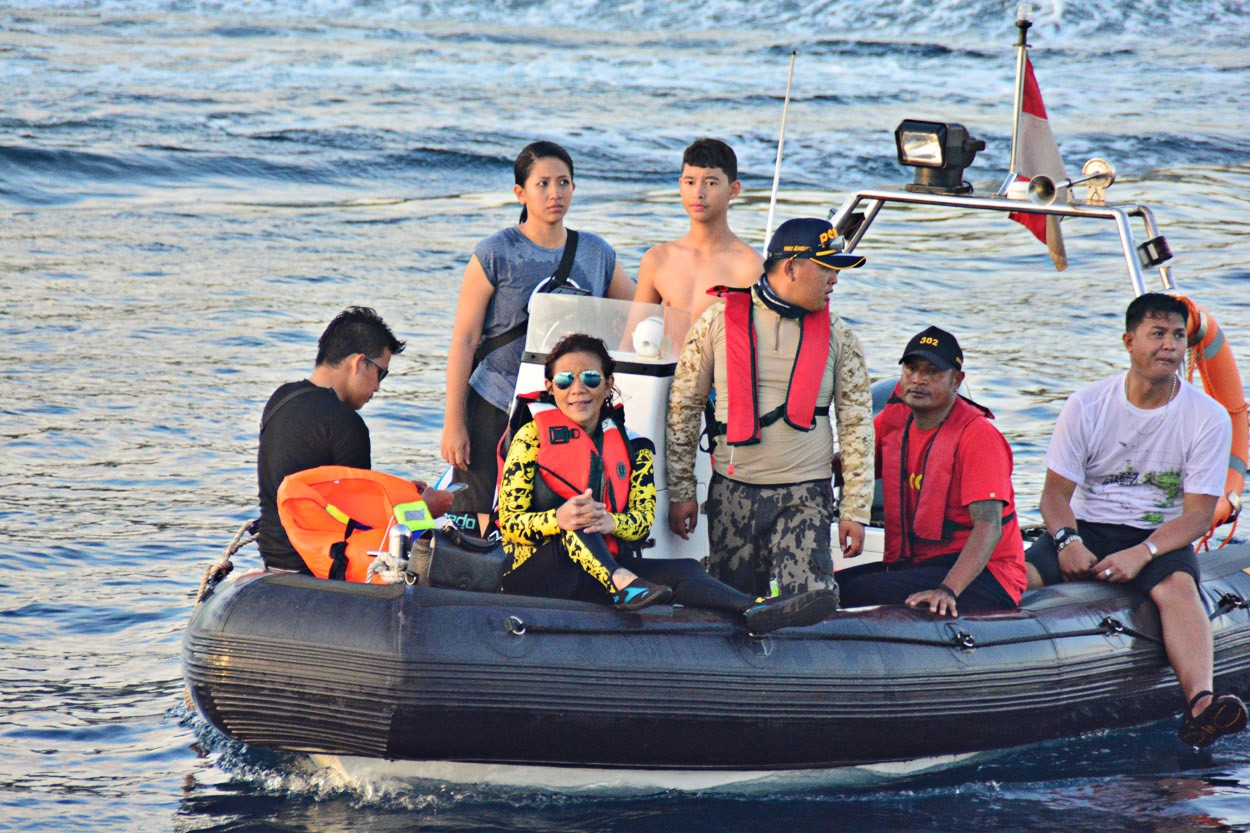 Stay alert -- Maritime Affairs and Fisheries Minister Susi Pudjiastuti (center) takes an opportunity to travel around Komodo National Park waters during her visit in West Manggarai, Flores, East Nusa Tenggara, on Monday. The minister said the government was ready to sink 30 foreign vessels for allegedly fishing illegally in Indonesian waters. (thejakartapost.com/Markus Makur)
Stay alert -- Maritime Affairs and Fisheries Minister Susi Pudjiastuti (center) takes an opportunity to travel around Komodo National Park waters during her visit in West Manggarai, Flores, East Nusa Tenggara, on Monday. The minister said the government was ready to sink 30 foreign vessels for allegedly fishing illegally in Indonesian waters. (thejakartapost.com/Markus Makur)
A
fter President Joko “Jokowi” Widodo signed the ratification of the Port State Measures Agreement (PSMA) in May, Indonesia can rest assured of global partnership in its effort to prevent, deter and eliminate illegal, unreported and unregulated (IUU) fishing.
The long due event heralded Indonesia’s stronger commitment to combat IUU fishing largely blamed for the world’s dwindling fish stocks and the missing US billion dollars worth of marine resources vital for food security.
Now, Indonesia is among 34 countries, plus the EU, that have joined the agreement that aims to block access of IUU fishing products to the legal market.
Admittedly, much is yet to be done to make the common effort effective given that the world’s biggest fish consumers and exporters like China, Japan and Taiwan have yet to join it.
As of today, only four of the world’s 10-largest fish-producing countries have been party to the PSMA: Indonesia, the US, Chile and Thailand, while China, Peru, India, Japan, Vietnam, and Russia have not.
Last month, the countries that have ratified the accord celebrated its formal enforcement during a fisheries conference at the UN Food and Agriculture Organization’s (FAO) headquarters in Rome.
It took almost a decade for the PSMA to come into force. Some countries came up with the idea in 2007. Indonesia was the 25th FAO member country to sign the agreement when it was opened for signature in 2009.
Under the UN, an accord can be enforced with the support of at least 25 member countries.
That it took eight years for Indonesia to ratify it remains a mystery. Indonesian officials duck for cover when the issue is raised; but it is widely believed that behind the impasse were politically wired businesspeople that feared the pact would jeopardize their interests.
Even though it is but one of numerous methods to combat illegal fishing, the PSMA is expected to bolster Indonesia’s firepower made famous by Maritime Affairs and Fisheries Minister Susi Pudjiastuti’s literally dynamite approach.
The accord is a milestone in the global effort against IUU fishing, which combined with ineffective fish stock management has wasted between US$75 billion and $125 billion of global output every year, not to mention extensive damage to the marine ecosystem, the World Bank figures show.
It is especially important for Indonesia, where IUU incurs losses of about $20 billion in revenues and has particularly affected small-scale fishermen, whose number declined to 800,000 from 1.6 million in the decade between 2003 and 2013, government statistics shows.
Indonesia can greatly benefit from the accord. Foreign fishing vessels may enter designated ports that enforce requirements prescribed by PSMA for stringent supervision.
For now, Indonesia has earmarked five commercial fishing ports: Samudera Bungus in West Sumatra, Nizam Zachman in Jakarta, Samudera Bitung in North Sulawesi, Nusantara Ambon in Maluku, and Nusantara Pelabuhanratu in West Java.
Stringent procedures are billed to make the PSMA highly effective. First, any fishing vessels wishing to enter the designated port must provide details on registration, licenses, total loads, catch origins, kinds of fish and what it wishes to download. Then, once received by the port master, the vessel is examined for validity of its documents. Port officials will have access to the vessel’s flag state for verification.
Under the PSMA, parties to the agreement must close all their ports to IUU fishing and its support vessels. It helps them identify vessels suspected of committing IUU fishing and deny them access to, or the use of, their port services.
For Indonesia, guarding its 17,500 islands and 95,000 kilometer coastlines against modern, well-equipped pirate ships sailing under flags of convenience can be an overwhelming duty for security authorities.
Inadequate patrol boats, corruption, weak law enforcement are but a few major problems. To make his dream of making Indonesia a global “maritime axis” come true, Jokowi has improved coordination among maritime security agencies and set up Task Force 115, which has been credited for destroying about 180 illegal fishing vessels since its establishment in 2014.
It is understood that the root cause of IUU fishing is the lack of effective state control of vessels’ flags. Many states have failed to meet their obligations under international laws to properly control and supervise vessels authorized to fly their flags.
Now, member countries must take the initiative to stop the chain of illegal fishing activities, ensure the legality of the fish on board by examining the information of the incoming foreign vessels.
According to the FAO, IUU fishing threatens sustainability of global fisheries; yet lack of transparency in the sector means the perpetrators can fearlessly go about their criminal enterprise.
Consequently, illegally caught fisheries products find their way into the legitimate market while global secrecy hampers efforts to impose effective traceability measures.
The PSMA requires that parties to the agreement register all fishing vessels of 100 gross tons or larger with the London-based International Maritime Organization (IMO) for a global record that is made available real-time.
The record builds and shares a global database of fishing vessels’ identities, including names, owners, flag states, authorizations, physical characteristics, inspections, and presence on IUU lists. It is meant to improve traceability and dissemination of data on global fishing fleets.
A PSMA requirement that Indonesia has yet to meet is having all fishing vessels weighing 100 gross tons bear registry numbers issued by the IMO, the UN agency overseeing safety and security of shipping and prevention of pollution by ships.
According to the 2014 edition of The State of World Fisheries and Aquaculture, the world’s fishing vessels numbered about 4.72 million in 2012 with the largest being in Asia, with 3.23 million vessels.
The PSMA greatly facilitates exchange of information among countries which need vital real-time information in combating IUU fishing. They will spread the identities of vessels engaged in IUU activities and block poachers’ access to the international market.
Developing countries like Indonesia will have easy access to international cooperation, such as training for inspectors, capacity building, technical assistance and funding for activities related to PSMA. Now Indonesia should design ministerial regulations, facilities and adequate human resources to meet PSMA requirements. Designated ports have to be up to par with PSMA standards.
It looks like a long way to go but joining forces with other port states is definitely a good option.
***
The author is a staff writer at The Jakarta Post.
---------------
We are looking for information, opinions, and in-depth analysis from experts or scholars in a variety of fields. We choose articles based on facts or opinions about general news, as well as quality analysis and commentary about Indonesia or international events. Send your piece to community@jakpost.com. For more information click here.


